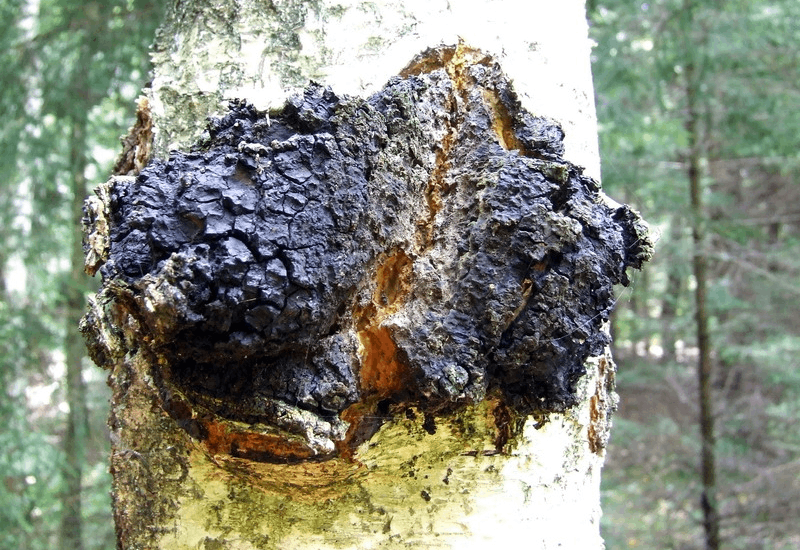The Chaga mushroom, scientifically known as Inonotus obliquus, is a parasitic fungus that primarily grows on birch trees in cold climates.
Used for centuries in the traditions of various cultures, Chaga is recognized for its many health benefits. This article explores these benefits (within what European claims legislation allows us to do) and gives you advice on how to incorporate Chaga into your daily routine.

The Health Benefits of Chaga:
-
Immune System Boost Chaga is rich in antioxidants, notably polysaccharides and beta-glucans. Studies have shown that Chaga extracts can increase the production of splenic lymphocytes and other important immune cells such as interleukin 6 (IL-6) and T lymphocytes (Frontiers) (Dr. Axe).
-
Antioxidant Properties Chaga has an exceptional antioxidant capacity, measured by its ORAC value (oxygen radical absorbance capacity). Research has shown that compounds extracted from Chaga offer powerful antioxidant activity. (The Botanical Institute) (ChagaHQ).
-
Digestive Support The compounds present in Chaga may promote digestive health. By soothing inflammation and balancing the gut microbiome, Chaga can contribute to better digestion and optimal nutrient absorption. Studies on animal models have shown that Chaga can reduce blood glucose levels and increase antioxidant enzyme levels (The Botanical Institute) (ChagaHQ).
-
Skin Health Chaga contains melanin and natural antioxidants, which give it a dark color and protection against oxidation. (ChagaHQ).

How to Consume Chaga?
The consumption of chaga powder (Inonotus obliquus) can vary depending on individual needs and specific product recommendations. In general, the recommended dose of chaga powder is as follows:
- Daily dosage: Most sources recommend taking between 1 to 2 grams of chaga powder per day.
-
General recommendations :
- Start slowly: If you have never consumed chaga before, start with a lower dose, for example 1 gram per day, to see how your body reacts.
- Split the dose: You can split the daily dose into two intakes, for example 0.5 grams in the morning and 0.5 grams in the afternoon or evening.
- Beverages and preparations: Chaga powder can be mixed with hot drinks like tea or coffee, or added to smoothies.
- Medical consultation: If you have pre-existing medical conditions or are taking medications, consult a healthcare professional before starting to use chaga.
Incorporating Chaga into Your Diet
-
Chaga Tea One of the most common methods of consuming Chaga is in the form of tea. Simply boil water and add Chaga powder. Let it steep for about 10 to 15 minutes to release all the benefits of the mushroom.
-
Chaga Chocolate Mousse For a gourmet touch, incorporate Chaga powder into your chocolate mousse recipe. The subtle flavor of Chaga pairs well with chocolate, adding not only health benefits but also a depth of taste.
-
Invigorating Chaga Smoothie For a more original option, add a teaspoon of Chaga powder to your morning smoothie. Blend with fresh fruit, yogurt, and honey for a nutritious and energizing breakfast.

Why Choose Our Chaga?
Our Chaga, available on La Mycosphère, is carefully selected to ensure optimal quality. We make sure that each batch is rich in antioxidants and other beneficial compounds. By choosing our product, you ensure that you consume pure Chaga, without additives, which will support your health in a natural and effective way.
Conclusion
Incorporating Chaga into your diet can offer many health benefits. By using this superfood responsibly and adhering to the recommended doses, you can enjoy its exceptional properties while adding a new dimension to your daily recipes.
Scientific References
- Abu-Reidah, I.M., et al. (2021). Chaga mushroom: a super-fungus with countless facets and untapped potential. Frontiers in Pharmacology.
- Li, X., et al. (2022). The potential applications of Chaga mushroom in agriculture. ScienceDirect.
- Hwang, J.H., et al. (2019). Anti-cancer properties of Chaga mushroom: A review. Journal of Ethnopharmacology.
- Razumov, S., et al. (2020). Inonotus obliquus: Ethnomycology and pharmacology. Phytotherapy Research.
- Teplyakova, T.V., et al. (2022). Biological activities and chemical composition of Chaga mushroom. Biomedicine & Pharmacotherapy.
- Hong, S.M., et al. (2015). Traditional uses and modern research on Chaga mushroom. Journal of Fungi.





